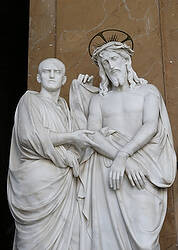During the long Gospel reading on Sunday, we heard about Jesus and Barabbas, and the choice that Pilate outsources to the angry crowd. It's a dramatic scene; and it reinforces the cruelty and cowardice that conspire to destroy Jesus. But like all of scripture, the episode becomes even more powerful once you dig into the layers of meaning embedded in the context, the language, the history, and the names. To that end, I want to share the following excerpt from the first volume of Pope Benedict XVI's Jesus of Nazareth. Benedict writes:
At the culmination of Jesus’ trial, Pilate presents the people with a choice between Jesus and Barabbas. One of the two will be released. But who was Barabbas? It is usually the words of John’s Gospel that come to mind here: “Barabbas was a robber” (Jn 18:40). But the Greek word for “robber” had acquired a specific meaning in the political situation that obtained at the time in Palestine. It had become a synonym for “resistance fighter.” Barabbas had taken part in an uprising (cf. Mark 15:7), and furthermore—in that context—had been accused of murder (cf. Lk 23:19, 25). When Matthew remarks that Barabbas was “a notorious prisoner” (Mt 27:16), this is evidence that he was one of the prominent resistance fighters, in fact probably the actual leader of that particular uprising.In other words, Barabbas was a messianic figure. The choice of Jesus versus Barabbas is not accidental; two messiah figures, two forms of messianic belief stand in opposition. This becomes even clearer when we consider that the name Bar-Abbas means “son of the father.” This is a typically messianic appellation, the cultic name of a prominent leader of the messianic movement. The last great Jewish messianic war was fought in the year 132 by Bar-Kokhba, “son of the star.” The form of the name is the same, and it stands for the same intention.
Origen, a Father of the Church, provides us with another interesting detail. Up until the third century, many manuscripts of the Gospels referred to the man in question here as “Jesus Barabbas”—“Jesus son of the father.” Barabbas figures here as a sort of alter ego of Jesus, who makes the same claim but understands it in a completely different way. So the choice is between a Messiah who leads an armed struggle, promises freedom and a kingdom of one’s own, and this mysterious Jesus who proclaims that losing oneself is the way to life. Is it any wonder that the crowds prefer Barabbas?
If we had to choose today, would Jesus of Nazareth, the son of Mary, the Son of the Father, have a chance? Do we really know Jesus at all? Do we understand him? Do we not perhaps have to make an effort, today as always, to get to know him all over again?








